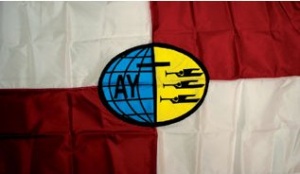AY Honors/Christian Citizenship/Answer Key
1. Describe the national, state or provincial, AY, Pathfinder, and Christian flags.
Current state flags
2. Know how to display the national flag with two other flags under the following situations:
a. Camp out/camporee
b. Fair
c. Pathfinder Day program
d. Parade
When marching in a parade, there is only one flag that has guidelines as to its location. That flag is the U.S. flag.
When marching with only one row of flags, the U.S. flag is always on the right end of the row (that is as viewed from the column following behind the flags).
When marching with multiple rows of flags, the U.S. flag is always to be in the front row. The U.S. flag is also alone in the first row. The U.S. flag will be in the front row leading the column from the center position of the row.
The U.S. flag should never be dipped as a sign of respect to a dignitary. The Pathfinder flag, AY flag, Christian flag and state flags are dipped when the "eyes right" command is given, but the U.S. flag should be held vertically.
For displaying the flag in other situations (Camporee, Fair, etc.), see the flag protocol guidelines below.
This web site is very helpful for all situations. http://www.ushistory.org/betsy/flagetiq.html
3. Demonstrate how to fold and salute your national flag. Mention when and how it should be displayed.
Folding
Adventist Youth Honors Answer Book/Flag folding
Note that the flag is folded differently when preparing to raise unbroken on a flag pole.
Flag Protocol
Adventist Youth Honors Answer Book/Flag protocol
- Saluting the American Flag
- Civilians should place their right hands over their hearts, except when wearing athletic clothing, in which case they should remove their hats and stand at attention. No hand salute is necessary. Civilian men wearing hats should remove the hat and hold it at their left shoulder, with hand over heart. Aliens should simply stand at attention. Of course, those in uniform (including the Pathfinder full dress uniform) should render the military salute. When the flag is moving, as in a parade, it is proper to salute when it is six paces in front of you and hold the salute until it passes six paces beyond.
Please note. Relfections on the Youth Honors Answer Book. Flag Protocol. Placing flag beside a preacher on or beside a podeum/lecturn/pulpet.
The National Flag when on a pole should always be placed on the speakers right. To the left as viewd by the audience. This can be verified by looking at speaches by the US President. Flag is always on his right.
4. Explain the meaning of and reason for the National Anthem, and recite the words from memory.
The National Anthem of the United States of America is 'The Star-Spangled Banner'. The words were written on September 14 1814, on board a British frigate in Baltimore harbor, where the author, Francis Scott Key (1779-1843) had been detained after successfully petitioning for the release of a civilian friend. He was inspired to write the poem when he saw in the morning, the American flag still flying over Fort McHenry, which had withstood the British bombardment during the previous night. It has 4 verses and all of them end in “O’er the land of the free and the home of the brave!”, meaning that America was built on the aspects of freedom and independence.
- The Star Spangled Banner
- O say, can you see, by the dawn’s early light,
- What so proudly we hailed at the twilight’s last gleaming,
- Whose broad stripes and bright stars, through the perilous fight,
- O’er the ramparts we watched, were so gallantly streaming?
- And the rockets’ red glare, the bombs bursting in air,
- Gave proof through the night that our flag was still there;
- O say, does that star-spangled banner yet wave
- O’er the land of the free and the home of the brave?
5. Give the rights and responsibilities of a citizen of your country.
Rights
United States' citizens have the right to fully participate in the political system of the United States (with most member states having restrictions for felons, and a federal restriction on naturalized persons running for President and Vice President of the United States), are represented and protected abroad by the United States (through U.S. embassies and consulates), and are allowed to reside in the United States, and certain territories, without any immigration requirements. Here are some of the rights you have as a U.S. citizen:
- Freedom of Religion
- Freedom of Assembly
- To Keep and Bear Arms
- Freedom of Speech
- Freedom of the Press
- Protection for those Accused of Crimes
See http://www.csc.calpoly.edu/~jdalbey/Public/Bill_of_Rights.html for additional summarized rights.
Responsibilities
Citizens have the duty to serve in a jury, if selected. Citizens are also required to pay taxes on their total income from all sources worldwide, including income earned while residing abroad (regardless of the duration of the residence) – but only beyond the first $82,400 in this case because of the Foreign Earned Income Exclusion. The United States Government also insists that U.S. citizens travel into and out of the United States on a U.S. passport, regardless of any other nationality they may possess. Male U.S. citizens (including those living permanently abroad and/or with dual U.S./other citizenship) are required to register with the Selective Service System at age 18 for possible conscription into the armed forces. Although no one has been drafted in the U.S. since 1973, draft registration continues as a standby contingency measure in the event Congress was to decide to reinstitute conscription at some future date. Also, citizens are recommended to vote, but it is not required.
6. Have an interview with a local, regional, or national official of your country, and learn about his duties.
It is generally easier to get a local official to agree to an interview, though it is often more exciting to interview a more prominent person. The interview can be accomplished during a club meeting, and multiple Pathfinders can ask questions. Invite your guest well ahead of time, and make sure everyone in the club is on time. A visit by an official would be a very good reason to have everyone in the club wear their class A uniforms. If desired, you can make up several questions ahead of time, writing them on index cards, and distributing them to the members of your club. But do not be so rigid as to not allow them to ask spontaneous questions. Having questions prepared ahead of time on index cards are a good way to get things rolling. Here are some suggested questions:
- Could you describe a typical day at work?
- What is the most difficult part of your job?
- What is the most satisfying aspect of your job?
- To whom do you report?
- How did you get your position? Were you elected, appointed, or hired?
- How should a young person prepare for a life of public service?
7. Write a one-page essay or give a two-minute oral report about a famous person in your country. Mention what he has done to gain his recognition.
This would be an excellent opportunity to present a worship during the opening exercises of a regular club meeting. Encourage your Pathfinder to choose a person they are personally interested in. If they cannot think of anyone themselves, have a list of suggested persons at hand and encourage them to choose from the list. Famous people might be historical figures, politicians, actors, sports stars, or anyone else. It would be preferable to choose a person who has been a positive influence on the country.
Although the requirement asks that you "mention what he has done to gain his recognition," this should not be interpreted as excluding women. Men are not the only famous people in a country.
8. Do one of the following:
a. Make a list of ten famous quotations from leaders of your country.
- '"These are the times that try men's souls. The summer soldier and the sunshine patriot will, in this crisis, shrink from the service of their country; but he that stands it now, deserves the love and thanks of men and women." - Thomas Paine
- "I know not what course others may take; but as for me, give me liberty, or give me death!" - Patrick Henry
- "Fear is the foundation of most governments." - John Adams
- "Democracy is two wolves and a lamb voting on what to have for lunch. Liberty is a well-armed lamb contesting the vote!" - Ben Franklin
- "I only regret that I have but one life to lose for my country." - Nathan Hale
- "We hold these truths to be self evident, that all men are created equal."- Thomas Jefferson
- Our flag is red, white and blue, but our nation is a rainbow - red, yellow, brown, black and white - and we're all precious in God's sight. - Rev. Jesse Jackson
- God grants liberty only to those who love it, and are always ready to guard and defend it. - Daniel Webster
- This nation can never be conquered from without. If it is ever to fall it will be from within. - President Abraham Lincoln
b. Make a list of ten famous historic places in your country.
- Independence Hall, Philadelphia, PA – Where the Declaration of Independence was signed.
- Statue of Liberty, New York, NY – Donated by the French to commemorate the centennial of the nation’s independence.
- Mt. Rushmore, Rapid City, SD – Monument with 4 presidents heads’ carved into rock; represents the growth of the US
- Old Faithful, Yellowstone National Park, WY – the biggest regular geyser in the US
- The Alamo, San Antonio, TX – Where Texas fought for freedom against Mexico
- Grand Canyon, Colorado River, Arizona – world’s largest canyon
- Plymouth, MA – where the pilgrims landed
- Washington, D.C. – nation’s capital; many monuments
- Boston, MA – many historic events like the Boston Massacre and the Boston Tea Party
- Niagara Falls, NY – biggest waterfalls in the U.S.
c. Make a list of ten famous historic events in your country.
- Ratification of the Constitution (1788)
- Signing of the Declaration of Independence (1776)
- Lincoln’s Gettysburg Address (1863)
- Lincoln’s Emancipation Proclamation (1863-freed the slaves)
- Revolutionary War (1776 to 1782)
- Washington becomes 1st president (1789)
- Civil War (1861 to 1865)
- Equal Rights Amendment proposed (it was never adopted) (1972)
- U.S. puts first man on the moon (1969)
- King’s “I Have A Dream” speech (1963)
9. Describe what you can do as a citizen to help your church and country.
The best way to help either your church or your country is by getting involved. Edmund Burke, an English philosopher summed this up when he said "The only thing necessary for the triumph of evil is for good men to do nothing."
In your church, this means that you will show up for services on a regular basis. It also means you will support it with your tithes and offering, show up for business meetings, and not wait to be asked before you volunteer your services. If you see something that needs done, do it. If you do not have the skill to do it, or you think that you need permission first, talk to your pastor, an elder, deacon, or deaconess. Find your ministry!
For your country, it is much the same. Show up for public meetings, stay informed about the issues of the day, vote if you are eligible, and pay your taxes fairly and promptly.
10. Go through the steps of an individual acquiring citizenship in the country and learn how this is done.
To become a naturalized United States citizen, one must be at least eighteen years of age at the time of filing, a legal permanent resident of the United States, and have had a status of a legal permanent resident in the United States for five years less 90 days before they apply (this requirement is reduced to three years less 90 days if they (a) acquired legal permanent resident status , and (b) have been married to and living with a citizen for the past three years.) They must have been physically present for at least 30 months of 60 months prior to the date of filing their application. Also during those 60 months if the legal permanent resident was outside of the U.S. for a continuous period of 6 months or more they are disqualified from naturalizing (certain exceptions apply for those continuous periods of six months to 1 year). They must be a "person of good moral character" and must pass a test on United States history and government. Most applicants must also have a working knowledge of the English language (there are exceptions for long-resident older applicants and those with mental or physical disabilities), although this requirement is not intended to be an onerous one, since the test requires that they read and write simple sentences in English, such as "The United States is a democracy". However, some applicants fail the language and civics tests, and others are deterred from applying for naturalization by virtue of the test requirement.
11. Know how to explain the process of government in your country.
Democracy in America is based on six essential ideals: (1) People must accept the principle of majority rule. (2) The political rights of minorities must be protected. (3) Citizens must agree to a system of rule by law. (4) The free exchange of opinions and ideas must not be restricted. (5) All citizens must be equal before the law. (6) Government exists to serve the people, because it derives its power from the people. These ideals form the basis of the democratic system in the United States, which seeks to create a union of diverse peoples, places, and interests. To implement its essential democratic ideals, the United States has built its government on four elements: (1) popular sovereignty, meaning that the people are the ultimate source of the government’s authority; (2) representative government; which means that the people delegate their powers to an elected official, (3) checks and balances; which means that there are three branches of government—the legislative, the executive, and the judicial— and they restrain and stabilize one another through their separated functions and (4) federalism, an arrangement where powers are shared by different levels of government. In the American federal system, the states and the national government divide authority. This division of power helps curb abuses by either the national or the state governments.
12. Explain the meaning of this statement Jesus made in Matthew 22:21: "Render therefore unto Caesar the things which are Caesar's, and unto God the things that are God's.
This verse teaches that governmental authority is to be respected, as long as it does not conflict with the moral obligations of being a Christian. Government serves a holy purpose; preserving social order, promoting the well-being of its citizens, and protecting their safety. If you believe that this does not apply today because you see the government as corrupt, you are urged to research the Roman government of the first century A.D. when these words were spoken by Jesus. Was Herod corrupt? Was Pilate just?
13. Explain why laws are established in your country.
This question is answered beautifully by the Preamble to the Constitution of the United States of America:
We the People of the United States, in Order to form a more perfect Union, establish Justice, insure domestic Tranquility, provide for the common defense, promote the general Welfare, and secure the Blessings of Liberty to ourselves and our Posterity, do ordain and establish this Constitution for the United States of America.
The Constitution is the supreme law of the United States, and the Preamble states its very purpose.
The Founding Fathers rocked.























































